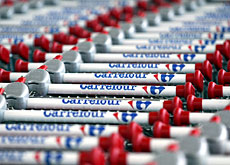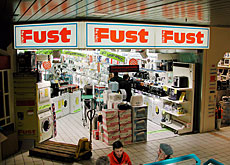Coop profits as Carrefour flees Switzerland

French supermarket chain Carrefour has ended its seven-year presence in Switzerland by selling its 12 hypermarkets to Swiss number two chain Coop.
The SFr470 million ($390 million) deal further consolidates the market in Switzerland. But experts believe consumers will not be hard done by with German discounters Aldi and Lidl enhancing competition.
Carrefour and partner company Maus Frères both sold their 50 per cent stakes in Swiss hypermarket operator Distributis to Coop on Tuesday. The enterprise has a 1.1 per cent share of the Swiss market, located mainly in the French-speaking part of the country, with 2,200 employees.
The French giant said it had not been able to gain enough critical mass in the difficult Swiss market. It has also withdrawn from a number of other countries around the world.
Carrefour’s plans were hampered by market restrictions and a failure to adapt to Swiss consumer demands, according to Professor Thomas Rudolph at St Gallen University.
“It’s really difficult to be successful in the Swiss grocery market for a foreign company like Carrefour because the market is protected with many regulations that make it very difficult to import grocery products from France into Switzerland,” Rudolph told swissinfo.
“For Carrefour it was difficult for them to understand the Swiss market. In Switzerland consumers behave in a different way to other European markets. The Swiss consumer is quality driven and is not so price sensitive.”
The deal has further contracted a market dominated by leaders Migros and Coop.
Takeover activity
Migros bought out Swiss discount chain Denner in January while Coop is pursuing the acquisition of electronic retailer Fust, although both deals still need regulatory approval. Denner had itself taken over rival discounter Pick Pay at the end of 2005.
Rudolph expects more mergers and acquisitions in the future with smaller grocery chains struggling in an increasingly competitive market.
Switzerland has a justified reputation as a high price island. But Rudolph believes the arrival of German discounter Aldi in 2005 and the impending entrance of Lidl, along with the expected lifting of import restrictions, will benefit consumers in the next few years.
“Consolidation will not hinder competition in the Swiss market. In the next two years prices will come down and this is good for the consumer. But prices should not come down to a point that quality is adversely affected,” he said.
Both Coop and Migros recorded an impressive leap in profits in 2006 despite sales growing more slowly than in previous years.
Migros announced in April that its profits grew 7.9 per cent in 2006 to SFr754 million ($626.6 million) while Coop reported profits were up by almost 15 per cent to SFr310 million.
The two retail giants dominate the Swiss retail industry with 30 per cent market share. For the food and drinks sector alone – excluding independent distributors – their market share jumps to 70 per cent.
swissinfo, Matthew Allen
Coop is a cooperative society with five regional sections. Around 2 million people are members of the cooperative, effectively making it a supermarket chain owned by its customers.
Migros is also a cooperative society, divided into 10 regions, with about the same number of members as Coop.
Migros sells no alcohol or cigarettes, but some of the retailers acquired or set up by the group continue to provide these products, including Globus, Migrol and Denner stores, as well as the online shopping service LeShop.
In 1995 Globus bought subsidiaries from Jelmoli before being swallowed by Migros two years later.
Coop launched a successful takeover of discount chains Waro in 2002 and EPA in 2004.
Migros landed a major coup in January this year by taking a 70% stake in Switzerland’s third largest supermarket chain Denner. The deal is still subject to regulatory approval.
Coop raided the Jelmoli group for electronic retail chain Fust in May. This is also being examined by the competition authorities.

In compliance with the JTI standards
More: SWI swissinfo.ch certified by the Journalism Trust Initiative












You can find an overview of ongoing debates with our journalists here . Please join us!
If you want to start a conversation about a topic raised in this article or want to report factual errors, email us at english@swissinfo.ch.